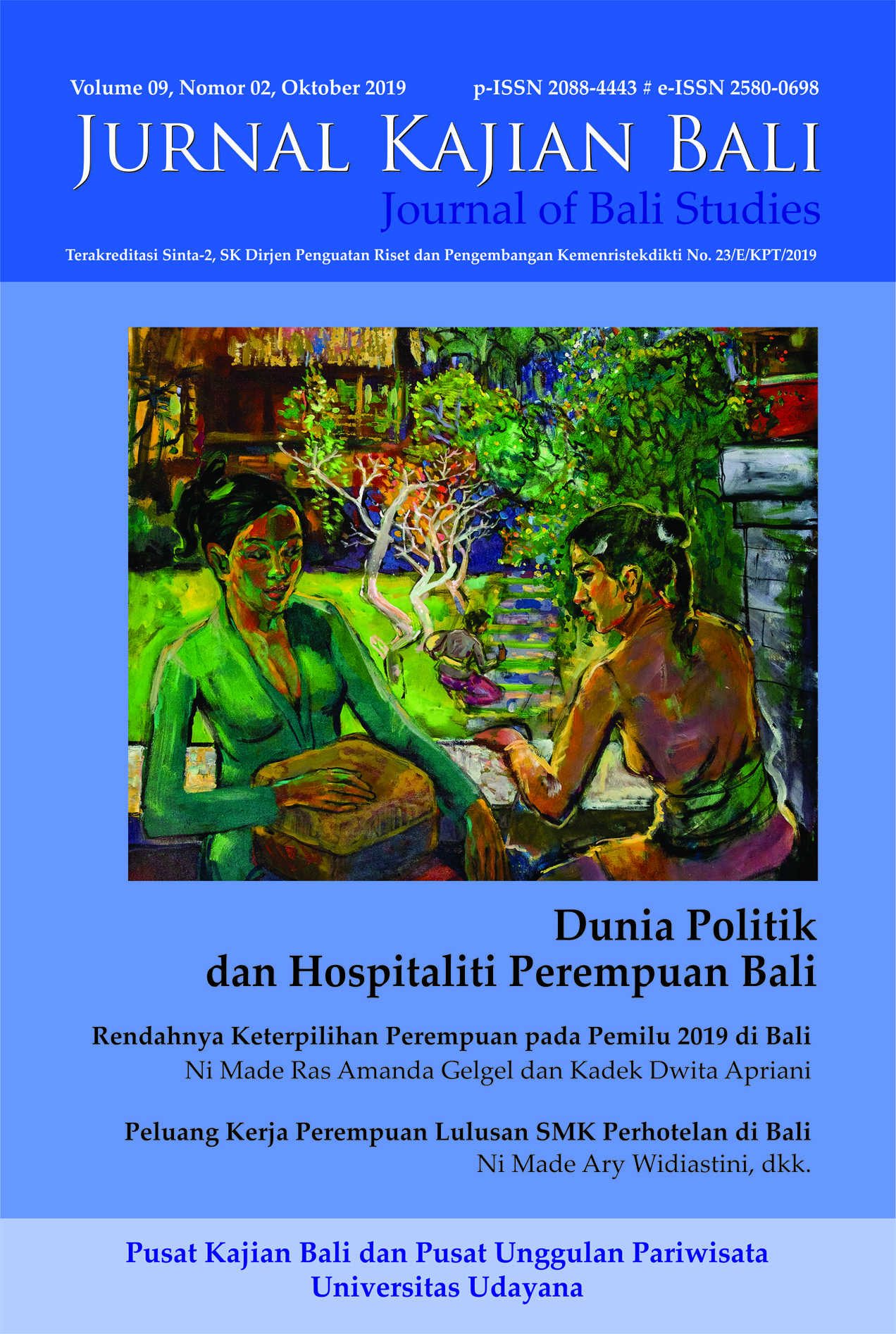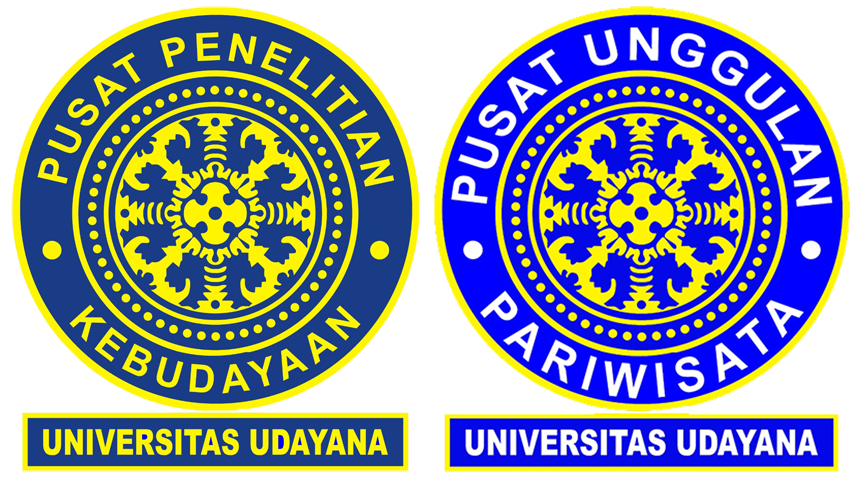Kajian tentang Penerapan Community Based Tourism di Daya Tarik Wisata Jatiluwih, Tabanan, Bali
Abstract
Jatiluwih Village is a tourist village located in Penebel District, Tabanan Regency. This tourist village has a beautiful natural panorama with unique terraces at the nearby Mount Batukaru. This study uses a qualitative research approach with a type of descriptive research. The formulation of the problem studied by researchers was twofold, namely: (1) the application of the CBT concept carried out by the Jatiluwih Tourism Village authority in managing sustainable tourism attractions (2) the role played by relevant stakeholders. This study concluded that the management of Jatiluwih DTW has applied the principles of a healthy economy, development for the welfare of local communities; conserve nature so that the environment can be well maintained, healthy culture by contributing to the cultures that exist in rural communities, and applying the principle of tourist satisfaction. This study suggests that the "subak" system and natural landscape are maintained because they are an indicator of the satisfaction of tourists visiting Jatiluwih.
Keyword: Community based tourism, Jatiluwih, World cultural heritage, Subak, Water irigation.
Downloads
References
Arismayanti, N.K., Widyatmaja, I.G.N., Wiraatmaja, I.W., 2017. The Establishment of Rural Tourism Based Creative Economy in Kendran Village, Gianyar. Udayana Journal of Social Sciences and Humanities, p.11.
Beeton, S., 2006. Community development through tourism. Landlinks Press.
Bhuiyan, M.H., Aman, A., Siwar, C., Ismail, S.M., Mohd-Jani, M.F., 2014. Homestay accommodation for tourism development in Kelantan, Malaysia. Theory and Practice in Hospitality and Tourism Research, p.239.
Blackstock, K., 2005. A critical look at community based tourism. Community development journal, 40(1), pp.39-49.
Butarbutar, R.R., Soemarno, S., 2012. Community Empowerment Efforts In Sustainable Ecotourism Management In North Sulawesi, Indonesia. Indonesian Journal of Environment and Sustainable Development, 3(1).
Butcher, K., 2003. Roman Syria and the Near East. Getty Publications.
Choi, H.S.C., Sirakaya, E., 2005. Measuring residents’ attitude toward sustainable tourism: Development of sustainable tourism attitude scale. Journal of Travel Research, 43(4), pp.380-394.
Denman, R., 2001. Guidelines for community-based ecotourism development. WWF International.
Dewi, N.I.K., Astawa, I.P., Siwantara, I.W., Mataram, I.G.A.B., 2018, January. Exploring the potential of cultural villages as a model of community based tourism. In Journal of Physics: Conference Series (Vol. 953, No. 1, p. 012072). IOP Publishing.
Dolezal, C., 2011. Community-Based Tourism in Thailand:(Dis-) Illusions of Authenticity and the Necessity for Dynamic Concepts of Culture and Power. Austrian Journal of South-East Asian Studies, 4(1), pp.129-138.
Ernawati, N.M., Sanders, D., Dowling, R., 2017. Host–guest orientations of community‐based tourism products: A case study in Bali, Indonesia. International Journal of Tourism Research, 19(3), pp.367-382.
Fiorello, A., Bo, D., 2012. Community-based ecotourism to meet the new tourist's expectations: An exploratory study. Journal of Hospitality marketing & management, 21(7), pp.758-778.
Hall, B.L., Clover, D., 2005. Social movement learning. International encyclopedia of adult education, pp.584-589.
Hall, S., 1996. Who needs identity. Questions of cultural identity, 16(2), pp.1-17.
Jha, N., Schoenfelder, J.W., 2011. Studies of the subak: New directions, new challenges. Human Ecology, 39(1), pp.3-10.
Junaedi, I.W.R., Utama, I.G.B.R., 2017. Agrotourism as the economics transformation of the tourism village in Bali (case study: Blimbingsari Village, Jembrana, Bali). Journal of Business on Hospitality and Tourism, 2(1), pp.10-24.
Koster, R., Randall, J.E., 2005. Indicators of community economic development through mural‐based tourism. Canadian Geographer/Le Géographe Canadien, 49(1), pp.42-60.
Kusrini, E., Rizkianto, I., 2018, January. Developing Mathematics Learning Materials based on Multiple Intelligence Theory, Learning Trajectory, and Conceptual Knowledge in the Topic of Probability for Eighth Graders. In University of Muhammadiyah Malang's 1st International Conference of Mathematics Education (INCOMED 2017). Atlantis Press.
MacDonald, R., Jolliffe, L., 2003. Cultural rural tourism: Evidence from Canada. Annals of tourism research, 30(2), pp.307-322.
Mago, Y.M.F., 2011. Community Capacity Building for Ecotourism: A Literature Review. In 2011 Conference Proceedings Conference Proceedings (p. 185)
McCann, T.V., Lubman, D.I., Clark, E., 2009. First-time primary caregivers’ experience of caring for young adults with first-episode psychosis. Schizophrenia bulletin, 37(2), pp.381-388.
Mitas, O., Blapp, M., Gosana, D., Frischknecht, A., 2017. Creative tourism in Bali's rural communities (by Manuela Blapp) & Respons to Manuela Blapp (by Djinaldi Gosana) &" Respecting creativity": respons to Manuela Blapp (by Astrid Frischknecht) &" Smart growth or sweet dreams?": respons to Manuela Blapp (by Ondrej Mitas). Tourism Destination Management Insights, 1(1), pp.19-24.
Norken, I.N., Suputra, I.K., Arsana, I.G.N.K., 2015. Water Resources Management of Subak Irrigation System in Bali. In Applied Mechanics and Materials (Vol. 776, pp. 139-144). Trans Tech Publications.
Peraturan Daerah provinsi Bali No 2 Tahun 2012 tentang Kepariwisataan Budaya Bali.
Poerwandari. K. 2011. Pendekatan Kualitatif untuk Penelitian Perilaku Manusia. Depok: Lembaga Srana Pengukuran dan Pendidikan Psikologi-Fakultas Psikologi Universitas Indonesia.
Putra, I.N.D. 2015. Pariwisata Berbasis Masyarakat Model Bali. Denpasar: Program Studi Magister Kajian Pariwisata Universitas Udayana
Rocharungsat, P., 2005. Community-based tourism: Perspectives and future possibilities (Doctoral dissertation, James Cook University).
Rosalina, P.D., 2017. The Implementation of Hindu Philosophy “Tri Kaya Parisudha” for Sustainable Tourism in Munduk Village, North Bali. Jurnal Master Pariwisata (JUMPA).
Saputra, P., Putri, W.A., Fahriza, B., 2017, November. DOES BUKITTINGGI NEED AN AIRPORT?. In Global Research on Sustainable Transport (GROST 2017). Atlantis Press.
Scheyvens, R., 2002. Backpacker tourism and third world development. Annals of tourism research, 29(1), pp.144-164.
Singh, S., Timothy, D.J., Dowling, R.K. eds., 2003. Tourism in destination communities. Cabi.
Singh, T.V. ed., 2012. Critical debates in tourism (Vol. 57). Channel View Publications.
Speziale, H.S., Streubert, H.J., Carpenter, D.R., 2011. Qualitative research in nursing: Advancing the humanistic imperative. Lippincott Williams & Wilkins.
Sugiyono. 2012. Metodologi Penelitian Pendidikan Pendekatan Kuantitatif, Kualitatif dan R & D. Bandung: Alfabeta.
Sunaryo, S., Suyono, J., 2013. A test of model of the relationship between public service motivation, job satisfaction and organizational citizenship behavior. Review Integrative Business & Economics, 2(1), p.384.
Sutawa, G.K., 2012. Issues on Bali tourism development and community empowerment to support sustainable tourism development. Procedia economics and finance, 4, pp.413-422.
Telfer, D.J. and Sharpley, R., 2007. Tourism and development in the developing world. Routledge.
Tirtawati, N.M., Dianasari, D.A.M.L., Saputra, I.G.G., 2019. The Challenge of Young Generation Involvement in Sustainable Tourism Development. Journal of Advanced Management Science Vol, 7(1).
Utama, I.G.B.R., 2016a. Keunikan Budaya dan Keindahan Alam sebagai Citra Destinasi Bali menurut Wisatawan Australia Lanjut Usia. JURNAL KAJIAN BALI, 6. Universitas Udayana, Denpasar
Utama, I.G.B.R., 2016b. Pengantar Industri Pariwisata. Yogyakarta: Deepublish,
Utama, I.G.B.R., Suyasa, N.L.C.P.S., 2018. The Segmentation of Visitor World Heritage Tourist Attraction of Jatiluwih Bali. Cultivating The Spirit of Sustainability, Innovation, & Governance For Businesses Around The World, p.44.
Wang, N., 1999. Rethinking authenticity in tourism experience. Annals of tourism research, 26(2), pp.349-370.
Weaver, D.B., 2012. Organic, incremental and induced paths to sustainable mass tourism convergence. Tourism Management, 33(5), pp.1030-1037.
Widari, D.A.D.S. 2015. Perkembangan Desa Wisata Jatiluwih setelah UNESCO menetapkan subaknya sebagai bagian dari warisan budaya dunia. JUMPA 2 [1]: 61 - 78
Windari, R.A., Hadi, I.G.A.A., 2016. Regulations Availability in the Management of Community Based Tourism (CBT) Villages in the Village of Jatiluwih. Singaraja: Universitas Pendidikan Ganesha, tersedia di laman www. eirai.org diunduh pada 30 Septmber 2019
Yodsuwan, C., Butcher, K., 2012. Determinants of tourism collaboration member satisfaction in Thailand. Asia Pacific Journal of Tourism Research, 17(1), pp.63-80.

This work is licensed under a Creative Commons Attribution 4.0 International License.



















